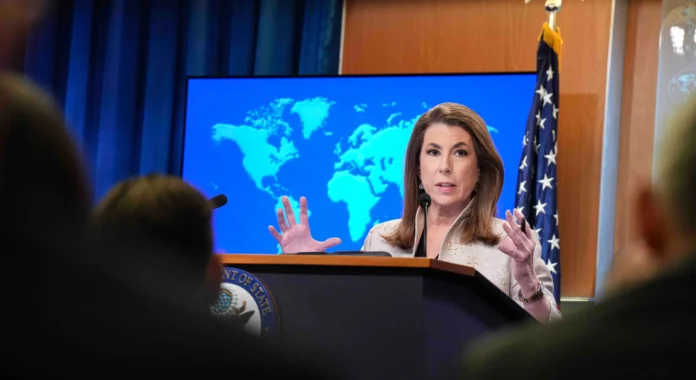The US Department of State on Tuesday (US local time) expressed concern over the rising extremism, anti-Semitic sentiment, and targeting of American companies in Bangladesh. Spokesperson Tammy Bruce, responding to pointed questions during the State Department’s press briefing, reiterated the importance of democratic values and emphasized that the future of Bangladesh lies in the hands of its people.
“Bangladesh Has Certain Issues” – US State Department
Addressing concerns over what was described as the rise of “Islamist extremism under the Yunus-backed regime”, Bruce stated:
“Bangladesh is a country with certain issues. They are also a country we have talked about often.”
She also referenced the recent legal action against UK MP Sadiq by Bangladeshi courts, stating:
“Protests and legal processes are matters for Bangladesh authorities to handle, but engaging with them matters a great deal.”
Bruce reinforced America’s democratic stance by saying:
“The future of Bangladesh is going to be decided by the Bangladeshi people. Elections matter. Democracy matters. And people confronting life-threatening issues deserve to have their voices heard.”
Modi-Yunus Meeting in Bangkok: India Voices Concerns
Earlier on April 12, during the BIMSTEC summit in Bangkok, Prime Minister Narendra Modi held a meeting with Chief Adviser Muhammad Yunus, where he conveyed India’s concerns regarding the safety and security of minorities in Bangladesh, particularly Hindus.
According to Bangladesh’s Foreign Secretary Md Jashim Uddin, the meeting was described as “an important step forward.” Responding to India’s concerns, Uddin emphasized:
“The government of Bangladesh is committed to ensuring the safety and security of every citizen, regardless of their creed, colour, religion, or ethnicity. We do not tolerate any form of violence or intimidation.”
Assurance from Bangladesh on Minority Rights
Uddin further reaffirmed Bangladesh’s commitment to upholding minority rights, noting that security agencies are expected to thoroughly investigate atrocities where needed.
He also expressed hope for regional cooperation and economic growth, stating:
“South Asia can grow together. Economic development in one country can complement the growth in others.”


